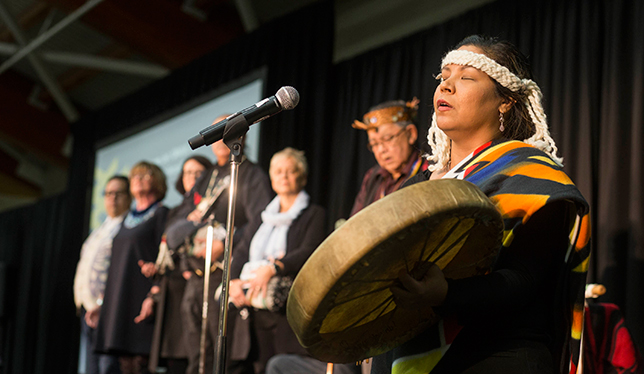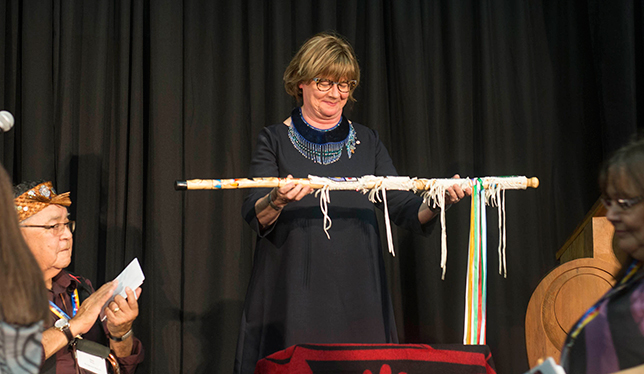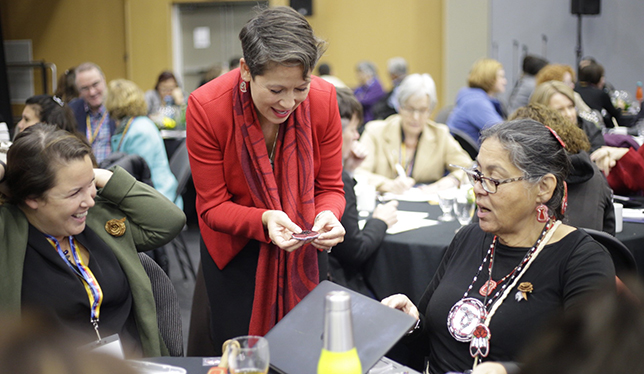Following the teachings of the Coast Salish people of southern Vancouver Island, the hosts of significant events invite four witnesses to observe the proceedings and be able to provide a record of what took place. That protocol was upheld for the opening ceremonies of the fourth National Building Reconciliation Forum, held on November 15 and 16 at the University of Victoria. The university is located on the traditional territory of the Lekwungen-speaking peoples.
In addition to calling the four Coast Salish witnesses, forum organizers also invited four symbolic academic witnesses, noted Robina Thomas, UVic’s executive director of Indigenous academic and community engagement. The witnesses “pay attention to everything that goes on at the event, particularly that we followed protocol, that we respected people, that we listened to people, that we did the work properly, that we ran the event in a respectful way,” she explained.

The ceremony of calling witnesses established the tone for the event, which brought together 250 leaders from Indigenous communities, government and universities. The annual gathering, hosted at a different university each year in partnership with Universities Canada, is held to discuss how universities can collaborate with Indigenous communities to answer the Truth and Reconciliation Commission’s 94 Calls to Action.
CBC broadcast journalist and chancellor of UVic, Shelagh Rogers, welcomed the “hard-working, committed and visionary people” in attendance. “You would not be here if you were not passionate about building a new relationship between Indigenous and non-Indigenous peoples in Canada. The very fact of your presence signifies that you are hopeful that this new relationship can be built.”
Ms. Rogers added that UVic president Jamie Cassels “has warned us to watch out for token gestures and quick fixes.” Quoting Professor Cassels, she said, “What we do must be sustainable and long-term.”

The 2018 forum’s theme, Ts’its’u’ watul tseep, means “to help one another” in the HUL’Q’UMI’NUM’ language. The theme was chosen to reflect the commitment of postsecondary institutions to work with Indigenous communities and students in the process of reconciliation through changes to university courses, programs, services and governance.
The first day of the conference took place at the Songhees Wellness Centre, a sports and cultural facility on the Songhees Nation, followed by a day on the UVic campus. The university launched, this past September, a first-of-its-kind joint law degree program in Canadian Common Law and Indigenous Legal Orders.
Over the two days, forum participants attended four panels made up of thought leaders discussing child welfare and health; language and culture; education, entrepreneurship and socio-economic capacity building; and education and justice. The panellists included academics, university administrators, elders (or “Old Ones,” as the Coast Salish people of the area prefer to call them), Indigenous artists, and representatives from the not-for-profit and business communities.
The theme of helping one another was incorporated into the design of the forum schedule. Following the panel presentations, attendees participated in discussions to learn from each other, hear about programs and administrative changes other institutions have made, assess their progress and shortfalls, and collaborate on solutions for the future, all to advance Truth and Reconciliation.
Paul Davidson, president of Universities Canada, said the roundtable discussions are the spirit of the forum. “This is a national gathering to reflect on the truth and also learn best practices from one another,” he said. “What is working, what can accelerate change, what can embed change, what can we do to make sure that we are all proud of the work that we’ve done in this time of reconciliation.”
In 2015, the 96 institutions that are members of Universities Canada adopted a set of principles designed to help more Indigenous students pursue higher education. Great work has been accomplished since then, Mr. Davidson said, but “there’s still a huge amount of work to be done.”
In the panel on language and culture, Jean-Paul Restoule, an Anishinaabe scholar and chair of Indigenous education at UVic, challenged universities to “let Indigenous communities lead.”
Dr. Restoule gave an example of residential school survivors struggling in traditional-language courses. He has observed that, before they can begin to learn the language, they need to do personal work around reducing the shame instilled in them for speaking their language. Ultimately, the language could not be taught the same way one might teach, say, Spanish or Italian. Dr. Restoule advised universities to partner with Indigenous people to find out what they need. “Knowledge resides in [these] communities,” he said.
The theme of letting Indigenous peoples dictate their needs came up again in the panel on entrepreneurship and socio-economic development. Rick Colbourne, a Fulbright Fellow and adjunct instructor at the University of Northern British Columbia, urged participants to consider, “What is entrepreneurship from an Indigenous perspective?” He recommended universities teach how business “is complicit in colonization” and incorporate “Indigenous ways of understanding business” into the classroom to best support students and communities.

To help participants in their future work around reconciliation, forum organizers paid special attention to how the ideas and commitments generated over the two days were recorded. In addition to the eight witnesses acting as the forum’s record keepers, organizers collected a list of key take-aways from the roundtable discussions; these will be assembled into a report that will be made available online. What’s more, attendees were given a postcard on which to write a personal commitment that they will honour by this time next year to bring about the healing and change necessary for reconciliation.
At the closing of the forum, Universities Canada announced the hosts for the 2019 forum. For the first time, five postsecondary institutions have been named as co-hosts: Algoma University, the Shingwauk Kinoomaage Gamig institute, Cape Breton University, Nipissing University and the University of Northern British Columbia. The event will be held at Algoma U in Sault Ste. Marie, Ont., in the traditional territory of the Anishinaabe people.
Next year’s participants will have the opportunity to visit the first major, permanent residential school survivor-driven exhibition located in Algoma’s Shingwauk Hall, a former residential school building located on campus. Attendees will also have the chance to visit the $10.2-million Anishinabek Discovery Centre, scheduled to open in 2019. The centre will be home to Shingwauk Kinoomaage Gamig, one of Ontario’s nine Indigenous institutes of higher learning. The institute will house the National Chiefs Library, the first Indigenous-led research library in Canada.